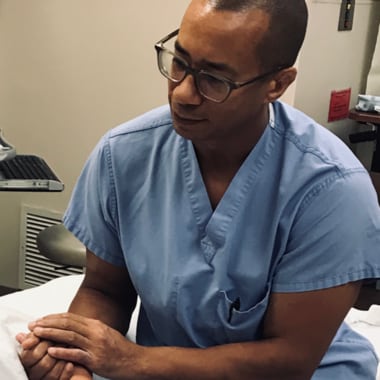Dr. Peter Jenkins is a 1995 Baltimore alumnus and current Trauma Surgeon & Assistant Professor of Surgery at Indiana University Health.
What are the biggest takeaways from your corps experience?
Probably my biggest takeaway is that at its foundation, Teach For America seeks to advance education policy on behalf of children who are socioeconomically disadvantaged while working directly with those children to improve their educational conditions. That dual mission of service through policy and individual care has also shaped by career in the field of medicine. As a trauma surgeon and health services researcher, I work closely with state government to promote policies that improve the health care quality of injured patients, while continuing to serve those patients as a physician. Engagement at both levels has been essential for me. My policy priorities have been set by the needs of my patients, and my passion for patient care has been fueled, in part, by my belief that healthcare conditions can improve when informed by meaningful policy.
Could you share an anecdote with a student that impacted the way you viewed or thought about educational equity and your individual role?
Warren was one of my students, and he was repeatedly getting into fights. One day, I kept Warren after school so that we could meet with his parents to discuss the situation. As I cleaned the room and tried to process my own frustration, Warren drew pictures of what he called his nightmares. What became clear to me, as he described those pictures, was that Warren was being abused, he was running away from his home each night, and he was living on the streets until school opened. At first, I was overwhelmed and ashamed as I tried to get Warren the help he needed. Over time, the shame of my own frustration with Warren became a deep and lasting sense of humility. My insight into anyone else’s life, whether that person is a student or patient, is exceedingly limited, and my work on behalf of others must reflect that fact. These days, I am more actively engaged in the fight for equity in health care than education, but the same principle applies. Rather than advancing my own solutions, I have sought to promote the voices of those most in need. My memories of Warren still weigh heavily on me, and I have tried to honor his memory by exercising humility through my actions and reminding myself that we are all doing our best.
How are you contributing to addressing systemic inequities?
As a corps member, I chose to pursue a career in medicine, because I was moved by how the lives of many of my students were influenced by their chronic health conditions, and as a medical student, I chose to become a trauma surgeon, because traumatic injuries disproportionately impact people who are socioeconomically disadvantaged. I can’t really claim that I address systemic inequities in my role as a surgeon, aside from teaching residents and medical students to serve each patient with compassion. However, I am explicitly focused on systemic inequities through my work as a health services researcher. Rather than advocating for a particular trauma-related issue such as firearms control, the focus of my research is on quality improvement in healthcare. That work relies on the demonstration of disparities in clinical outcomes such as mortality and disability, either among hospitals or for certain populations, and I work with relevant stakeholders to develop targeted, hospital-based quality improvement initiatives. By developing such a program for on-going trauma quality improvement, my aim is to reduce healthcare disparities while advancing a system of care that can benefit all people.
